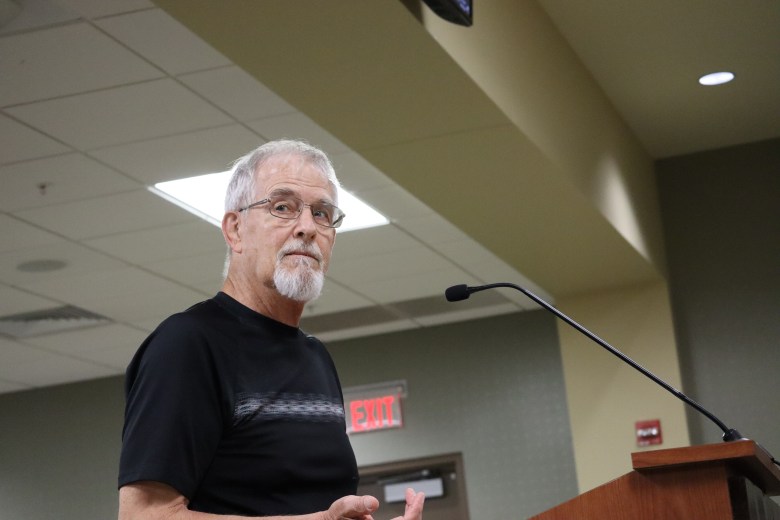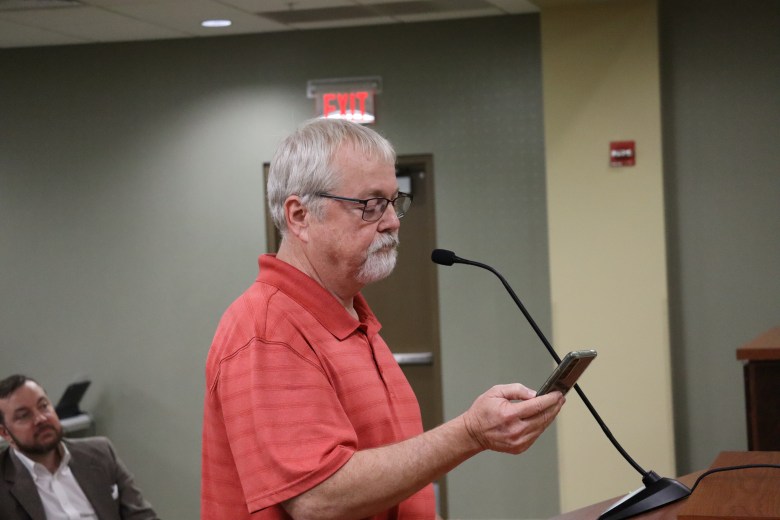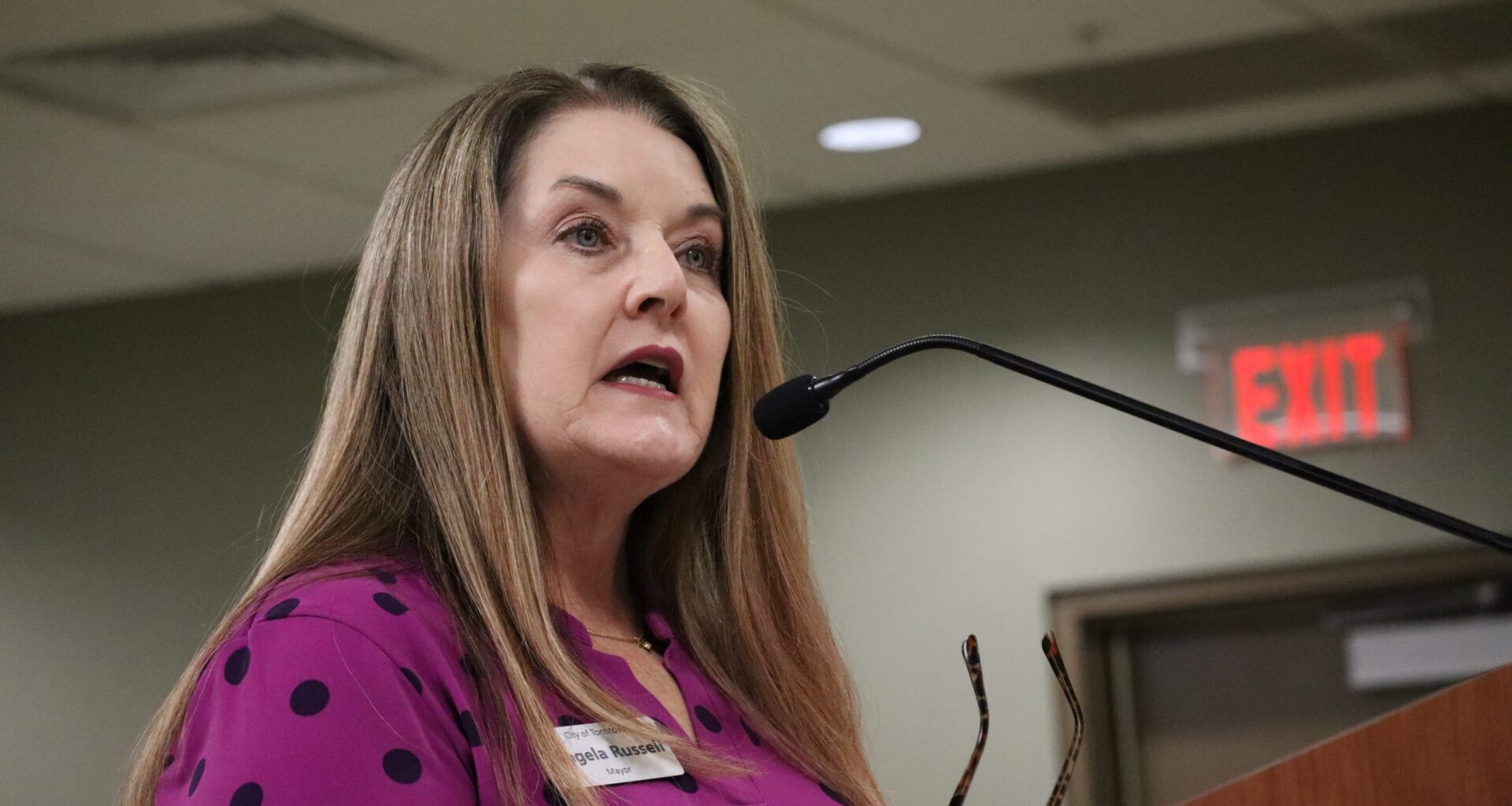State environmental regulators moved forward with a permanent ban on hog farms in the Buffalo River Watershed, but residents of Tontitown received no news on concerns over air pollution and a landfill that residents of the tiny Washington County town believe are making them sick.
During the Arkansas Department of Environmental Quality’s Pollution and Ecology Commission meeting Friday, the commissioners voted unanimously to update environmental regulations to include a ban on “concentrated animal feeding operations” in the Buffalo River Watershed. The matter will next go before the Arkansas Legislative Council’s administrative rules subcommittee.
Concentrated animal feeding operations, or CAFOs, are operations where animals are raised in confined areas. Waste from such operations can contaminate groundwater and nearby waterways, which is why organizations like The Ozark Society and the Buffalo River Watershed Alliance have opposed hog CAFOs close to the Buffalo River.
In 2019, Arkansas announced a deal to close a hog farm in the Buffalo River Watershed after widespread outcry over its proximity to the Buffalo, an increasingly popular tourist destination in the region. Former Gov. Asa Hutchinson also issued a moratorium to prevent large pig farms from operating near the river and protected watershed.

“I wanted to encourage the continuation of the moratorium, but there are a couple of things I would like to mention,” David Peterson, former president of The Ozark Society, said in his remarks to the commission. “The Buffalo River watershed is less than 2% of Arkansas land area, which means that 98% of the state is available for hog CAFOs if the conditions are right. That may be a problem for agriculture but it’s not because of the moratorium. The question is where does ADEQ draw the line if they don’t enforce the moratorium.”
Peterson and Gordon Watkins, who serves as the President of the Buffalo River Watershed Alliance, both attended the Friday meeting to encourage the commission to adopt the moratorium as a permanent change to Arkansas law.
The Arkansas Farm Bureau opposes the ban.
“The ‘right to farm’ is a foundational principle that supports the continuation of agricultural operations without unreasonable interference,” Farm Bureau said in public comments. “This rule not only affects swine producers but could also have a lasting impact on the broader farming community and future generations of farmers. The proposed moratorium sets a precedent that could potentially lead to further restrictions on various types of farming within the watershed and beyond.”
While the Pollution Control and Ecology Commission voted to include language banning CAFOs around the Buffalo River in regulation 6, Watkins noted that CAFOs have always been permitted in the state under regulation 5. And now regulatory authority for regulation 5 has been transferred to the Arkansas Department of Agriculture after a new law passed in 2023.
As the Arkansas Times previously reported, the Arkansas Department of Agriculture has never had this authority before. Environmentalists are concerned that the transfer of authority over CAFOs to the state’s agriculture department will lead to weak public notice requirements.
When ADEQ was in charge of permitting CAFOs under regulation 5, newspapers, local governments and neighbors would be notified of a new CAFO coming to their area. But under the Department of Agriculture’s proposed rule that they drafted after receiving authority to regulate CAFOs, new farms would not have to notify neighbors, local governments and newspapers of their permits.
Watkins said that while he “felt good” about the Pollution Control and Ecology Commission’s decision to propose a permanent moratorium in regulation 6, he knows that a larger fight lies ahead with the other regulation now under the jurisdiction of the Arkansas Department of Agriculture.
Both the changes to regulation 6 made by ADEQ and the Department of Agriculture’s new proposed rule for permitting CAFOs will eventually make their way to the Administrative Rules Subcommittee of the Legislative Council to be approved or denied by the state legislature.
The Administrative Rules Subcommittee considers changes to regulations by state government departments like ADEQ. Previously, the Arkansas Legislative Council threw out an effort to impose a permanent moratorium on hog farms in the Buffalo River Watershed, so Watkins and other environmentalists said they remain cautious a meaningful permanent ban will ever be put in place.
Both the Arkansas Department of Agriculture proposed rule and the new regulation 6 updates have the same language banning CAFOs in the Buffalo River Watershed. The Arkansas Legislative Council could consider both rules for final approval before the end of the year.
Tontitown still waiting for more air quality testing
Also during Friday’s meeting, Bailey Taylor, the head of ADEQ, provided an update on the air pollution in Tontitown.
Taylor said that ADEQ is still searching for a funding source to continue air quality monitoring around the EcoVista landfill that has been the subject of community concerns.
In July, ADEQ released a report showing increased levels of various air pollutants around the EcoVista landfill in Tontitown.
Read the Arkansas Times coverage of Tontitown’s air quality issues here.
EcoVista is the only landfill in growing Northwest Arkansas, and it denies being the source of the potentially hazardous pollution. But residents aren’t convinced. They are waiting on ADEQ to approve more testing.
The Arkansas Department of Health recommended more air quality testing after the July report showing elevated air pollution around the landfill. ADH said it could not conclusively determine the source of the pollution.
“The citizens of Tontitown need your help, we have got to do something about that landfill,” Mayor Angie Russell said in her public comments at the meeting. “I appreciate every one of you listening to me, and I hope someone follows up on this.”
At the meeting, Russell and Tontitown resident Kenneth Lovett pressed the commission for help.
 Credit: Phillip Powell / Arkansas Times
Credit: Phillip Powell / Arkansas Times
“I have to deal with this stuff everyday. I’ve been dealing with it for four years, and I haven’t gotten nothing yet,” Lovett said. “Do I have to move? Do I have to leave my home? What are ya’ll doing? We need help.”
